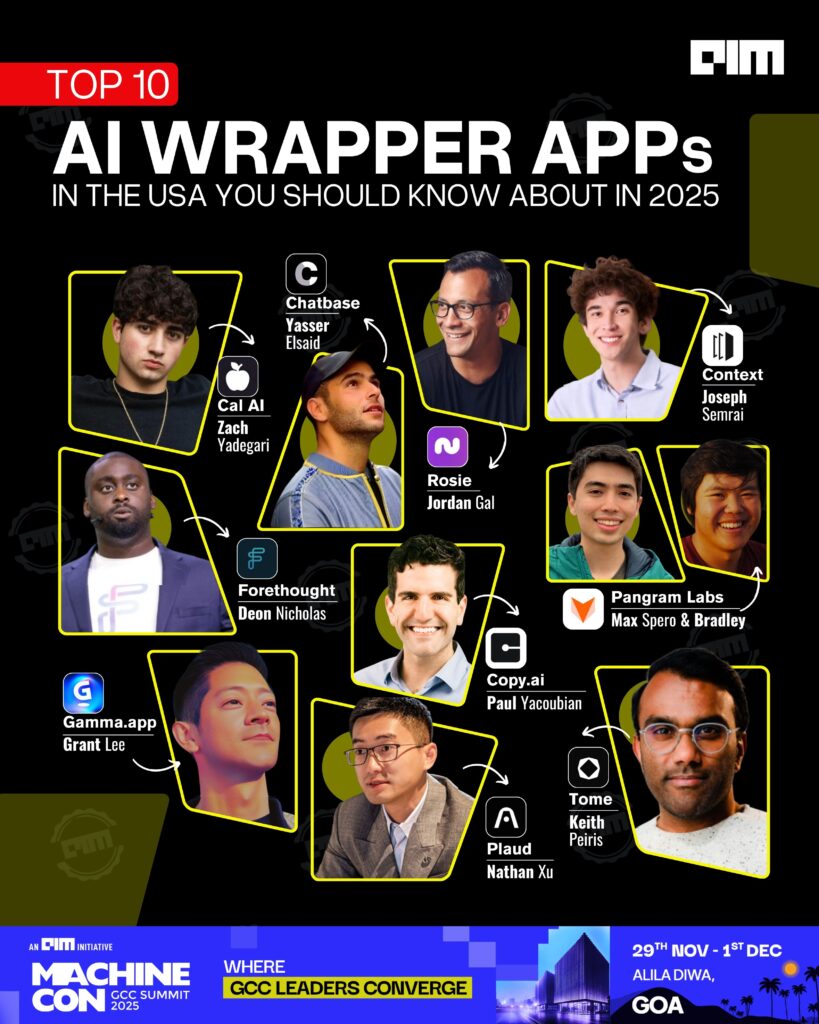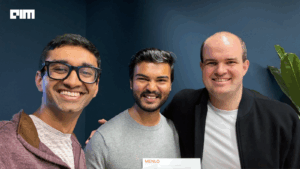“We strongly believe wrapper is just a misnomer at this point. The thing with consumer products is that user interaction and mind share still matter. If I have a problem with audio quality, I’ll go to 11 Labs. If I want to build a website, I’ll go to Lovable. So the single-purpose nature of each tool and the workflow you build actually matter a lot. Cursor for code, for example, is differentiated from the underlying base model because it focuses on the developer’s experience.” said Bryan Kim, Partner at Andreessen Horowitz.
This perspective captures why AI wrappers have become one of the most powerful forces in U.S. tech right now. By zeroing in on narrow, high-value use cases, wrapper apps transform broad foundation models into products that solve real problems for real users. They succeed not because they reinvent the underlying AI, but because they build intuitive workflows, recognizable brands, and targeted experiences that large models on their own can’t deliver. Far from being a throwaway label, “wrapper” has become shorthand for some of the fastest-growing and most profitable startups in AI.
Here are the Top 10 AI Wrapper Apps in the USA that show just how far this model has come and why it’s here to stay.

Cal AI
Founder- Zach Yadegari
Cal AI, founded in 2024 by teenager Zach Yadegari, quickly became one of the most talked-about AI wrapper apps in the U.S. by turning a simple idea which is snapping a photo of a meal to instantly log calories into a multimillion-dollar business. Yadegari, who began coding at age seven and previously sold a gaming site in high school, shaped the app by combining his technical skills with a relentless focus on solving his own frustration with manual calorie tracking. Alongside co-founders, he built an interface that wraps existing AI vision models into a sleek, user-friendly tool, funded early growth with personal capital, and scaled aggressively through social media marketing. Within months, Cal AI was generating over $1 million in monthly gross profit, making Yadegari one of the youngest CEOs running a fast-growing AI consumer app in the U.S.
Chatbase
Founder- Yasser Elsaid
Chatbase, founded by Yasser Elsaid in early 2023, began as a simple PDF chatbot built on top of OpenAI’s API, LangChain, and Pinecone, allowing users to upload documents and interact with them conversationally. Its viral launch, sparked by a single tweet demo that quickly amassed hundreds of thousands of views proved the concept’s appeal and helped it grow from $1,000 in monthly recurring revenue within a week to $1 million in annual recurring revenue in just five months. To stay ahead of imitators, Elsaid pivoted Chatbase into a more advanced AI agent platform for enterprises, integrating with tools like Stripe, Slack, Calendly, and Zapier to handle not just questions but customer actions such as refunds and scheduling. By February 2025, Chatbase had reached $5 million in ARR while remaining entirely bootstrapped, marking it as one of the most successful AI wrapper apps to emerge from the post-ChatGPT wave.
Rosie
Founder- Jordan Gal
Rosie, founded by Jordan Gal, is an AI-powered phone receptionist built as a wrapper on top of existing transcription, voice, and LLM services, with the real value delivered at the interface layer. Designed specifically for small businesses that rely heavily on phone calls, Rosie can answer 24/7, book appointments, respond to common questions, and send follow-ups—all while keeping owners informed of every interaction. By offering a simple UI that lets a local service company get an AI receptionist running in minutes, Rosie created a compelling alternative to voicemails or costly call centers, reaching $1 million in annual recurring revenue within its first eight months.
Context
Founder – Joseph Semrai
Context, founded by Thiel Fellow Joseph Semrai, is an AI-native office suite designed to replace the patchwork of productivity tools workers open each day. Rather than juggling Notion, Docs, Slack, and Zoom notes, users interact through a single chatbot interface that can draft investor updates, turn meeting notes into decks, or summarize calls and send follow-up emails. What distinguishes Context is its proprietary Context Engine, modeled on the human hippocampus, which can process more than 50 million tokens without the performance drop-offs common in long-context models. Backed by $70 million in funding from Lux Capital, General Catalyst, and Qualcomm Ventures at a $70M valuation, the platform uses swarm agents to traverse organizational knowledge bases, making connections across documents and delivering highly contextualized outputs in seconds.
Pangram Labs
Founder- Max Spero
Pangram Labs, co-founded by Max Spero and Bradley out of Stanford, positions itself as an AI wrapper app focused on one of the most pressing challenges in the generative AI era: detecting AI-generated text. Rather than developing foundation models, Pangram builds on top of existing advances with a specialized training approach it calls “synthetic mirrors,” repeatedly retraining on the hardest-to-classify documents to create a detection layer that educators and institutions can use seamlessly. Delivered through a simple, accessible interface, Pangram’s technology wraps complex AI detection methods into a practical tool for classrooms and content integrity, reaching a level of accuracy that extends even to paraphrased or “humanized” outputs that typically evade other detectors.
Forethought
Founder- Deon Nicholas
Forethought, founded by Deon Nicholas, is an AI wrapper app built to transform customer support by layering a user-friendly platform over powerful AI models and integrations. Its Autoflows technology orchestrates a multi-agent system that can reason, plan, and act across tools like CRMs and APIs, enabling businesses to automate up to 90% of customer inquiries. Rather than building new foundation models, Forethought wraps existing AI capabilities into a specialized interface tailored for CX teams, offering end-to-end resolution of tickets, agent assistance, and actionable insights. Backed by more than $90 million in venture funding and trusted by companies such as Upwork, Grammarly, and Airtable, Forethought demonstrates how wrapper apps can package complex AI into practical, scalable solutions for enterprises.
Copy.ai ( acquired by Fullcast)
Founder- Paul Yacoubian
Copy.ai, founded in 2020 by Paul Yacoubian, is an AI wrapper app that makes generative models accessible to go-to-market teams through a simple, workflow-focused platform. What began as a series of MVP experiments quickly evolved into a product that wrapped OpenAI’s language models with an intuitive interface for marketing copy, sales outreach, and content generation, reducing friction for businesses adopting AI. Over time, Copy.ai expanded from single-use content creation into full workflow automation, helping global enterprises accelerate go-to-market execution by bundling data, integrations, and AI-powered processes. With more than 16 million users, Copy.ai shows how packaging foundation models into targeted, easy-to-use SaaS tools can unlock real value at scale.
Gamma.app
Founder- Grant Lee
Gamma, founded in 2020 by Grant Lee and two former Optimizely colleagues, is a standout U.S. AI wrapper app that turned the challenge of presentation creation into a high-growth business. After early struggles with user retention, the team rebuilt the product in 2023 by wrapping GPT-4 and Stable Diffusion into a streamlined interface that could generate slide decks and visuals automatically, eliminating the “blank page problem.” The pivot paid off: Gamma went viral after its relaunch, adding 3 million users in just three months and rapidly converting many into paying subscribers. By 2025, Gamma had expanded beyond presentations into a broader creative suite—supporting documents, websites, and social content—and reached over 50 million users, $50 million in annual recurring revenue, and profitability sustained for more than 15 months, all with a lean team of around 30 people and just $23 million in total funding.
Plaud
Founder- Nathan Xu
Plaud, founded by Nathan Xu and Charles Liu, has quickly become one of the most prominent AI wrapper startups in the U.S. wearable space with its NotePin recorder. The device captures conversations, meetings, or lectures and pairs with Plaud’s app, which wraps transcription and summarization models like ChatGPT into a seamless user experience. Since launching in 2023, Plaud has sold over a million devices to professionals such as doctors and lawyers, generating $250 million in annualized revenue and turning profitable without venture funding. By combining Shenzhen’s hardware manufacturing expertise with San Francisco–based AI engineering, Plaud has carved out a niche as a productivity-focused AI notetaker, offering an alternative to traditional dictaphones and positioning itself at the forefront of the growing market for wearable AI assistants.
Tome
Founder- Keith Peiris
Tome, founded by Keith Peiris, is an AI wrapper app that reimagines storytelling and presentations by layering a clean, intuitive interface over models like GPT-4. The San Francisco–based startup allows users to transform documents into polished slide decks in minutes, eliminating the friction of starting from scratch and competing directly with incumbents like Microsoft’s Copilot. Since its launch, Tome has attracted more than 3 million users, tripled its user base in a single month, and raised $81 million from investors including Lightspeed, Greylock, and Coatue at a $300 million valuation. By focusing on simplicity and speed, Tome demonstrates how wrapper apps can package powerful foundation models into accessible, consumer-ready tools that reshape everyday communication.










